“We’re getting the band back together!” That’s how the pitch must have gone for the founding team at Qumulo, who also happened to create Isilon, now a major product at EMC. But what do you do after creating the most successful scale-out storage platform in history? Add in some advanced data management services and make it a software-only platform!
What’s Qumulo?
CEO Peter Godman is joined by fellow Isilon alums, Aaron Passey (Chief Architect at Isilon and now Qumulo CTO), Neal Fachan (Distinguished Engineer at Isilon and Amazon AWS veteran, now VP of Engineering at Qumulo), and lots of others besides. There are probably some non-Isilon folks in the company, too, but I think it’s safe to say they have lots of talent. I spy Brett Goodwin, Chris Hoffman, and my old boss Peter Bell over there, too.
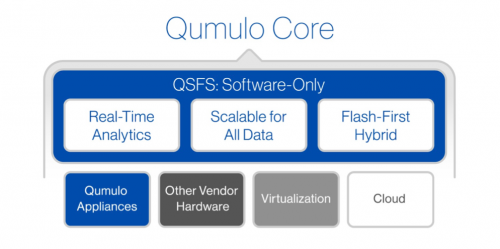
Like many of today’s storage startups, Qumulo is focusing on software. Although they are shipping branded appliances, it is pretty clear that the entire product focus is on the software layer. Well, layers: Qumulo de-couples their scale-out data layer from their filesystem, QSFS. We’ll get back to that later, but understand that, for now, this appliance pitch consists of these three components sold together.
Integrated Data Analytics
Let’s start with the most interesting part. Qumulo is delivering a scale-out storage solution with an integrated metadata engine. QSFS provides real-time analytics drawing on a database of file metadata that goes much further than traditional filesystems. It manages capacity and performance data by path, file, and client. And all of this is inside the filesystem itself, not an overlay or secondary application.
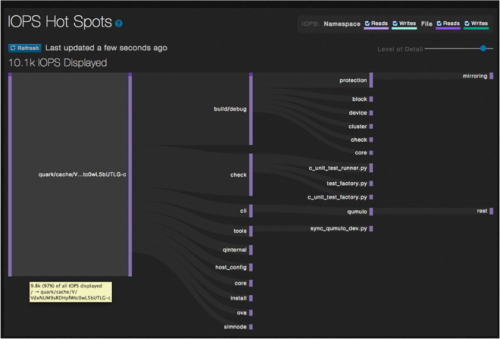
For example, QSFS has a fantastic hot spot graph allowing a systems administrator to instantly see which files are really getting pounded and which aren’t in use. It’s like storage resource management for performance, and I love it. It reminds me of my favorite capacity management tools (hi DaisyDisk!) but on a whole other dimension.
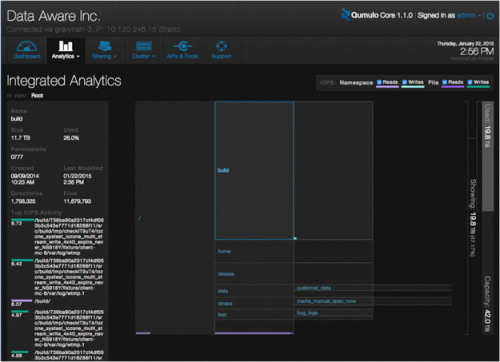
The Qumulo differentiator is that these lovely graphical representations are not scan-based. Rather than just maintaining the directory tree, the Qumulo filesystem maintains all this metadata in near-real time. They wisely decided to allow the metadata database to lag behind real reads and writes rather than having it in the I/O path. It’s like the difference between synchronous and asynchronous replication and is a good trade off – filesystem performance beats instantaneous graphs any day.
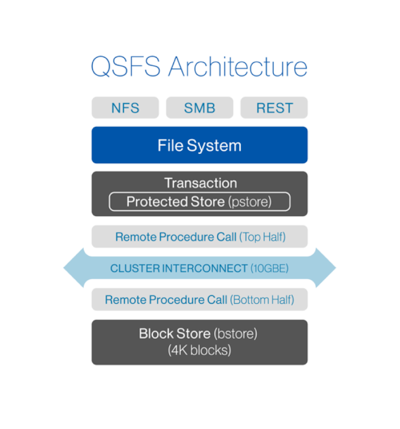
The Qumulo Core Software Sandwich
Qumulo does not combine data protection with the filesystem. Rather, they have a “protected store” layer (pstore) that handles scale-out, data placement, and redundancy that sits completely separate from their filesystem. The filesystem itself (QSFS) treats this scale-out block storage layer as a single contiguous address space rather than integrating filesystem semantics with protection. This is totally different from most other scale-out storage systems (including Isilon) which integrate a filesystem with a scale-out object store.
The block store was built from the ground up to reflect the unique aspects of today’s hybrid storage hardware. Qumulo’s solution is “flash-first”, meaning that it leverages the plentiful random I/O capabilities of flash memory to deliver high performance and advanced metadata capabilities. This means that it requires flash, of course, but it still runs on just about any old hardware.
Typical of today’s scale-out systems, Qumulo requires 4 nodes at a minimum to guarantee availability. This might seem like a surprise to traditional storage people, but it’s really a best practice. Unlike Isilon, which relied on InfiniBand, Qumulo is all commodity hardware, using a 10 Gb Ethernet interconnect. I wouldn’t be surprised if RoCE was in there somewhere, though.
The Qumulo appliance is built of industry-standard hardware – 1U Intel servers filled with SSD and HDD. Each node runs Linux with the Qumulo block store and protected store layers. The UI runs on every appliance, so an administrator can connect to any of them and see the entire system.
The initial appliance, called Q0626, contains two 800 GB SSDs and four 6 TB helium HDDs. Each has two 10 GbE ports and I spotted an Arista 10 GbE switch in there, too.
The Future of Qumulo
Theoretically, the QSFS layer could run on top of other block data stores, from a single virtual machine (this is how Qumulo does evaluations and demos) to a real scale-out storage layer. In theory, Qumulo could layer QSFS on just about any storage platform, even if it’s not a scale-out storage system. This presents some really interesting ideas for future branching out.
Let’s imagine Qumulo Core running in a VM or public cloud. It could run in an AWS SSD instance, for example, or on VMware vSphere. I can imagine a hybrid cloud scenario like SimpliVity which leverages both on-premesis physical appliances, virtual machines, and cloud instances.
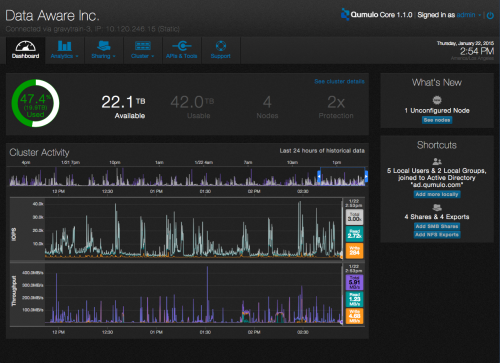
Another nice touch is the UI. The entire web UI is implemented using REST methods that can be exploited by developers or applications. This is even exposed right there in the UI so you can learn what does what just by using the system.
Stephen’s Stance
Qumulo has more than a dozen paying customers already. This is a new trend I’m seeing with storage companies – getting customers and putting systems in production before coming out of stealth. Combine this with the excellent team and funding and we have ourselves a real contender here.
But will the data management tricks be enough? Scale-out storage is hard to do, sure, but it’s becoming much more common. And quite a few companies are rumbling about their data management features. Some are even stepping into information management, which might prove a bridge too far for storage nerds to grok.
I suspect Qumulo will head in a very different direction than many other storage companies. Rather than building a scale-out storage solution, Qumulo Core could become a competitor for the likes of Maxta, Springpath, and VMware VSAN. After all, who wants to shift atoms these days?
You should also read:
- Dave Henry: Qumulo Comes Out of Stealth Offering Data-Aware Scale-Out NAS
- Martin Glassborow: Scale-Out of Two?
This company is run by spammers. Please dont sign up with them and endorse their UCE policy.